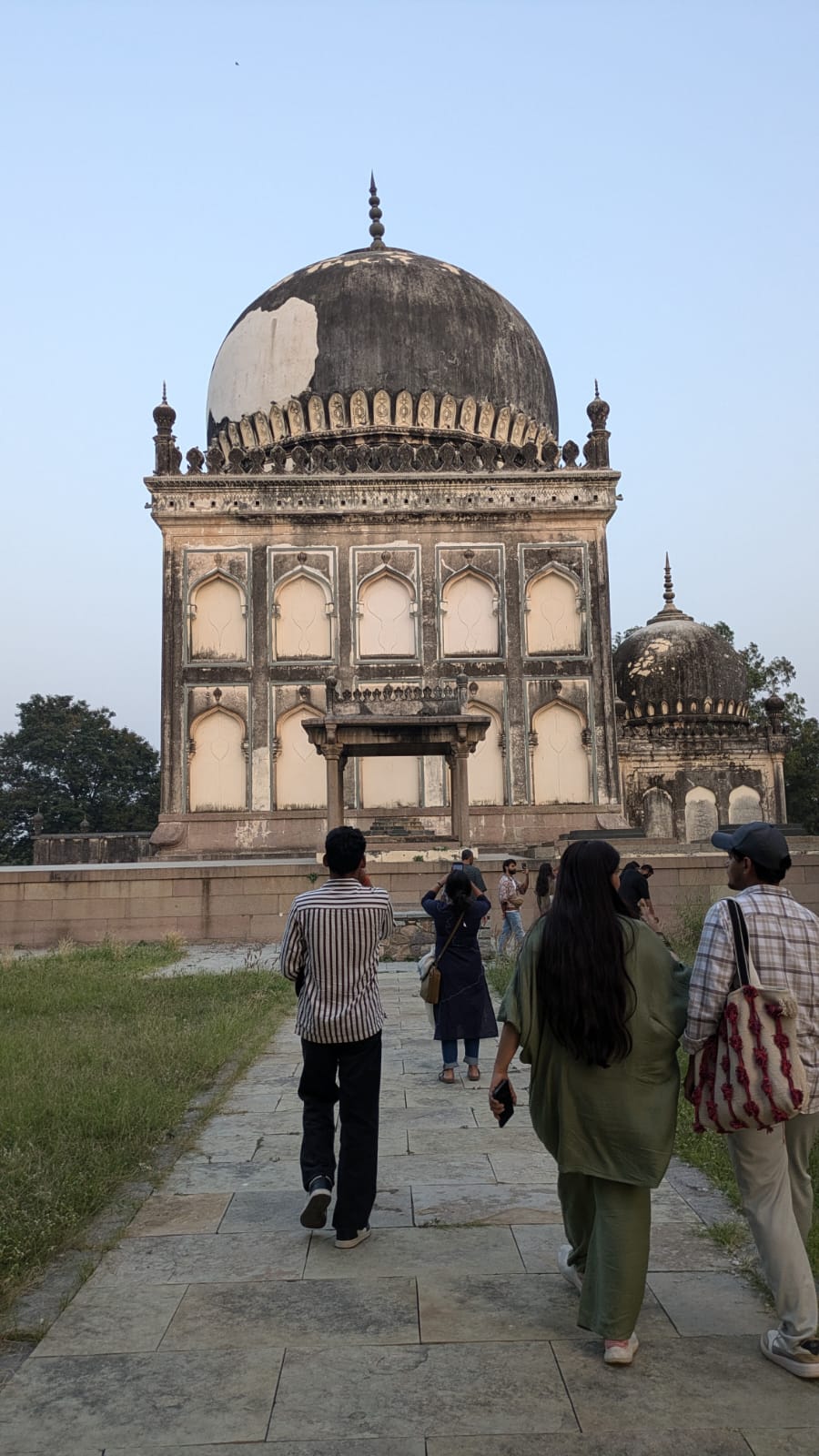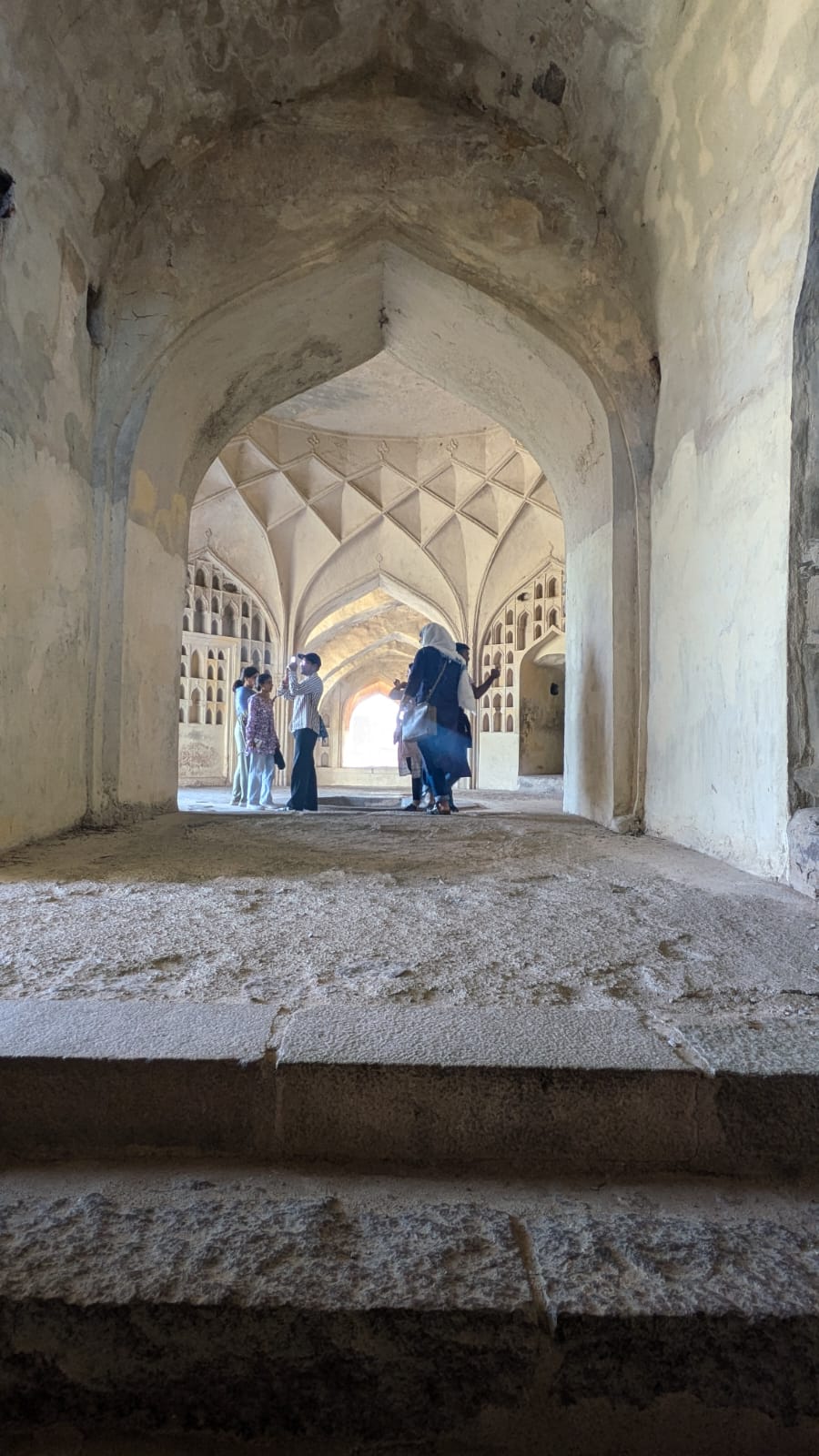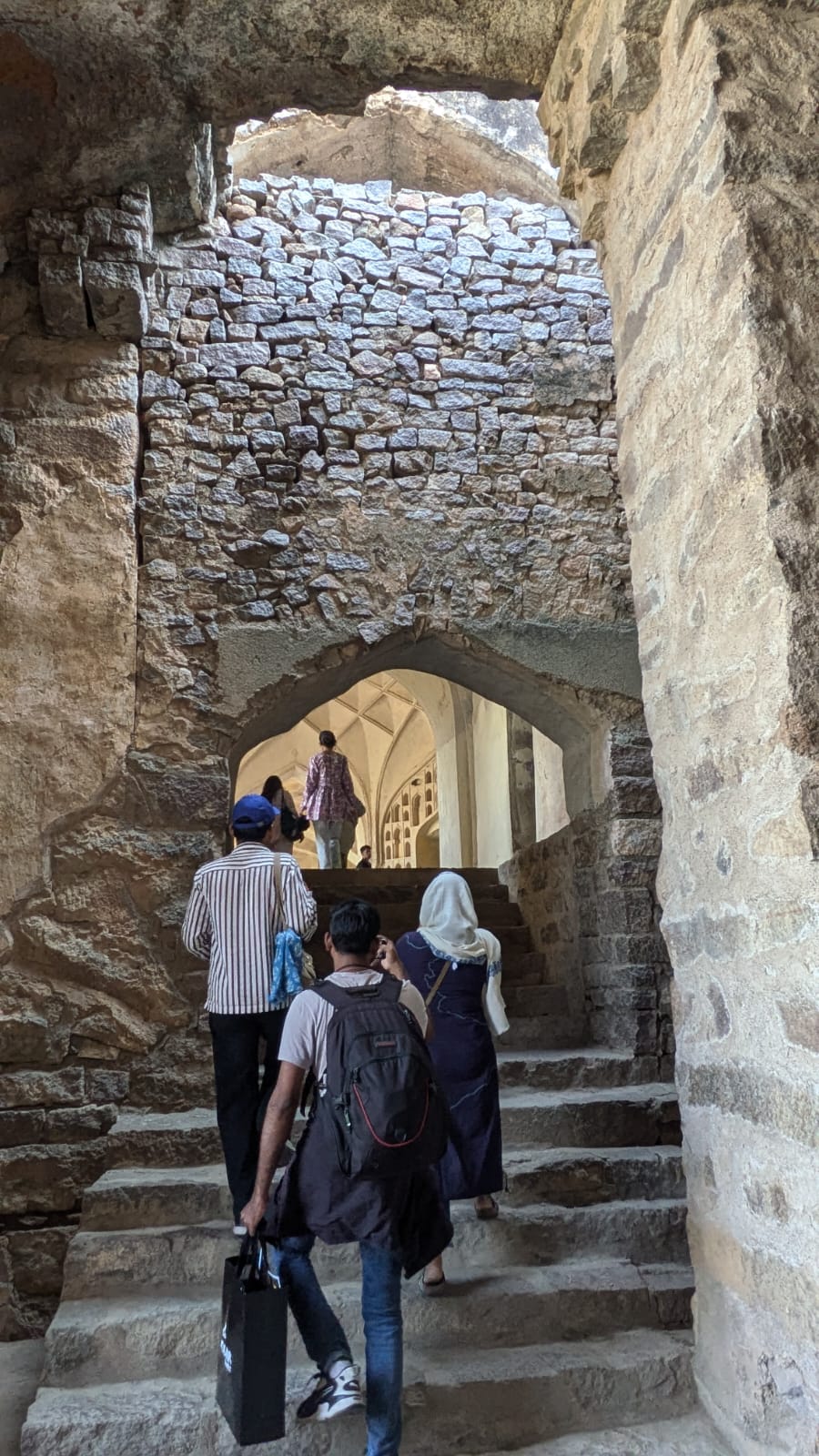SRM-AP All News
ALL News
- MoU with SHRI Opens New Pathways in Medicine February 12, 2025
In an effort towards enhancing academic and research capabilities, SRM University-AP and Samishta Hospital and Research Institute (SHRI) formalised an understanding on scientific cooperation in biological sciences and other areas of mutual interest. The MoU signing ceremony that took place at SRM University-AP and was signed by Dr R Premkumar, Registrar- SRM University-AP and Dr Kalyan Chakravarthy, Managing Director-Samistha Hospital and Research Institute, Guntur in the presence of Dr Sandeep and Dr Ravi Teja, Dr Varun, Dr Ramakrishna, Dr Gnana Prakash Doctors from SHRI and Prof. C V Tomy, Dean-School of Engineering and Sciences; Prof. Ranjit Thapa, Dean-Research; Prof. Jayaseelan Murugaiyan, Associate Dean-Sciences (Admission Outreach and Research Collaborations); Assistant Professors at the Department of Biological Sciences-Dr Sutharsan Govindarajan, Dr Anil K Suresh, Dr Prateek Gupta among others.
The MoU will open pathways for collaborative opportunities in research and academics, fostering joint research projects and funding possibilities while also emphasising the importance of skill development through seminars organised by both the institutions.
Registrar Dr R Premkumar highlighted the significance of this partnership and the potential outcomes of the joint venture. Dr Sutharsan Govindarajan thanked the team from Samistha Hospitals and Research Centre for joining hands and taking the phase therapy from bench to bedside. This MoU between the two institutes of eminence aims to create a dynamic environment for innovative research that will benefit not just our institutions but also the society in general.
Continue reading → - Field Trip to Hyderabad: A Journey of Education, Culture, and Adventure February 11, 2025
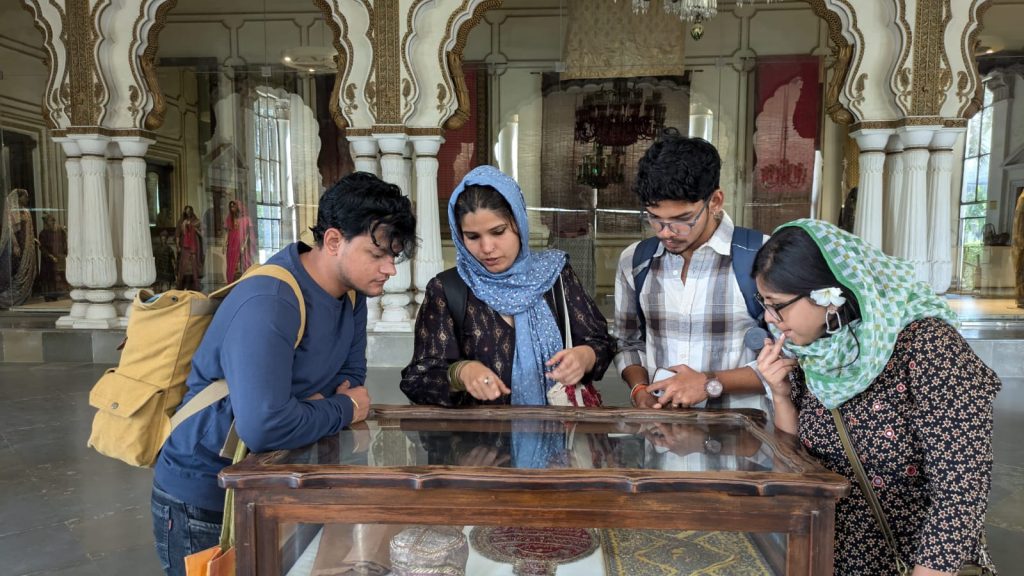
The 5th Semester B.A. History students went on a field trip to Hyderabad as part of their courses ‘Medieval India’ and the ‘Eighteenth Century in Indian History’. Dr Aqsa Agha, Course Coordinator, and Dr Manaswini Sen led the study group to explore the city’s historical and cultural significance, enhancing their learning outside the classroom for the two courses.
The group visited Charminar, exploring the iconic monument and its surrounding bazaars, Golconda Fort, discussing its history and architecture with a Heritage Walk Practitioner from Hyderabad, and finally the Qutb Shahi Tombs and gardens, a standing testament of Indo-Persian architectural excellence.
The field trip provided students with a refined exposure to the diverse culture and history of Hyderabad and the historical context of the evolution of the culture of the city. The students had a wonderful chance to visit the important historical monuments and urban morphology that mark the period of study in the courses on Medieval and Eighteenth-century Indian History.
The field trip fostered a deep understanding of the respective courses, inspiring students to explore beyond books and classrooms.
Continue reading → - Techno-Cultural Fest INFINITUS’25 Wrap up with a Bang February 10, 2025
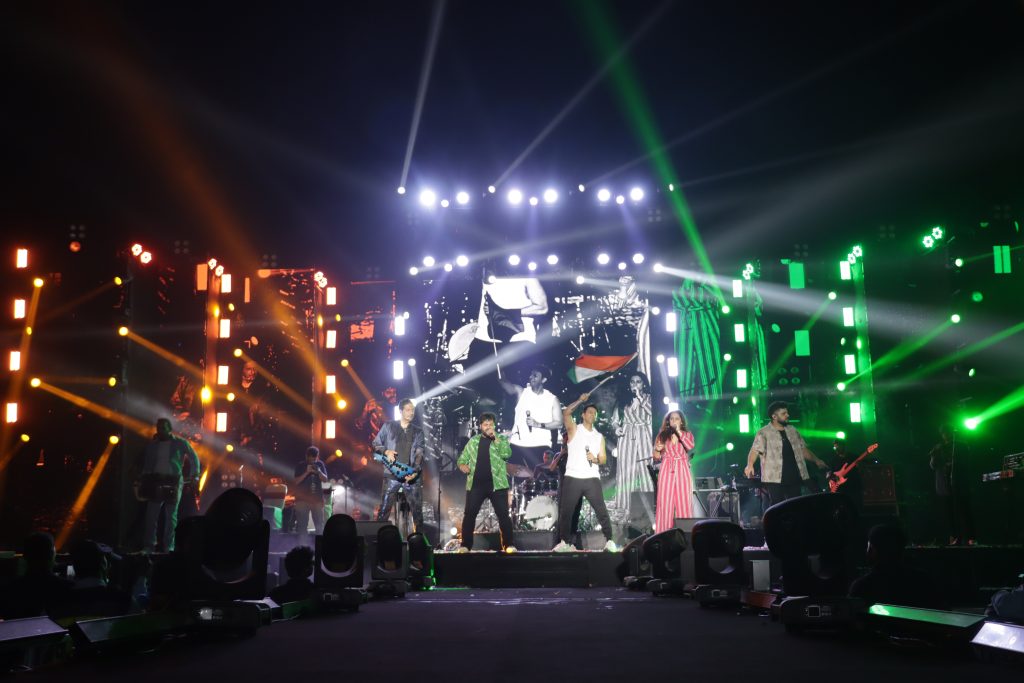
The four-day Techno-Cultural Fest, INFINITUS’25, from February 05-08, 2025, has come to a showstopping end at SRM University-AP. An incredible lineup of artists featured on the final two days of INFINITUS’25, including renowned music composer-performer duo Salim-Sulaiman Merchant. The duo and their team enthralled the audience with their popular hits and electrifying performances, transforming the campus into a captivating concert where they showcased an unforgettable stage.
The cultural performances also included a stand-up comedy act by Hoody, mesmerizing songs by Ram Miryala and a final showdown by DJ Akram. The performing artists set the stage ablaze with their incredible zeal and talent, and the grounds of SRM University-AP became a platform for fun, creativity and enjoyment.
The techno fest, a central highlight of INFINITUS 2025, commenced with great enthusiasm and an immense exhibition of talent. The inaugural function witnessed Vice President of PowerTrain at Volvo Group, Mr Kishan Sreenath, as the Chief Guest along with Vice Chancellor, Prof. Manoj K Arora; Registrar, Dr R Premkumar; Director of Student Affairs, Mr Anil Kumar Nigam; Chief Club Advisor, Dr Sujith Kalluri; and Student Council President, Mr B V S Laksman.
Chief Guest Mr Kishan Sreenath commended the ethos behind INFINITUS ‘25. He also highlighted the importance of problem statements in hackathons and their crucial role in advancing technology. Mr Kishan stressed how platforms such as INFINITUS ‘25 foster collaboration among individuals with varying backgrounds, benefiting society.

The HACK SRM Challenge was the standout event among the technical events, with 22 hours of nonstop hacking, six tracks, a grand prize pool of ₹ 1 Lakh, and ₹75k worth of sidetracks. Some of the other technical competitions of the fest included FIFA, Valorant, BGMI, Bullet Echo, and Rapid UI, to name a few. Navacharak bagged the 1st prize, followed by Pinterest Gillies in the Hack SRM Challenge, winning prize money of 50k and 30k, respectively. The winners of the techno expo- Mahammad Hassain, Yella Reddy, Sai Kumar, and Charmi bagged the prize money of 10k.
The final day of the Techno-Cultural Fest also hosted the much-awaited Mr and Ms Fresher competition, where the brightest, most talented, and deserving candidates were chosen as the title winners. Mr Aashir, a first-year B.Tech. student, and Ms Pratyusha, a first-year M.Sc. student, were selected as Mr and Ms Fresher, respectively. Other cultural programmes included Tech Tales, Cyber Vogue, Cyber Sway, Cyber Tunes and Glitch Stage where participants put on exemplary performances and won spectacular prizes. INFINITUS’25, organised under the aegis of the Directorate of Student Affairs and the Student Council of the university, was a resounding success, a memorable experience celebrating innovation, talent and creativity./p>
Continue reading → - Prof. Stefan Kalkhof on Advancing Biomaterial Design February 10, 2025

The Department of Biological Sciences organised an expert talk on “Guiding Biomaterial Design Through the Power of Omics Technologies” by Prof. Stefan Kalkhof on February 05, 2025. Prof. Kalkhof, a distinguished member of the Faculty of Applied Natural Sciences, Coburg University of Applied Sciences, Germany, and Head of the Proteomics Research Group at the Fraunhofer Institute for Cell Therapy and Immunology (IZI), Germany, began the session with an introduction to Coburg University, highlighting its rich academic history and research contributions, followed by a brief overview of the Fraunhofer Institute for Cell Therapy and Immunology (IZI), which is dedicated to developing the medicine of the future through innovative research in cell therapy and immunology.
Prof. Kalkhof’s talk focused on the potential of mass spectrometry-based proteomics and its wide-ranging applications in biomedical research. He emphasised how this advanced technology helps study the structure and function of drug targets, develop cancer-specific drugs, design functional implants, understand bacterial infections, and assess the toxic effects of chemicals.
A significant part of the discourse revolves around bone implants and tissue regeneration. He explained that although bones naturally regenerate, certain conditions, such as Type 2 diabetes and other metabolic disorders, may need bioactive scaffolds to promote healing. These smart scaffolds are designed to stimulate active tissue regeneration.
Prof. Kalkhof also spoke about the importance of proteomics technologies in regenerative medicine. He highlighted how mass spectrometry at the protein level plays a crucial role in healing, diagnostics, and drug development. His discussion extended to bioactive functional implants, a field that offers vast opportunities for materials scientists, chemists, toxicologists, and medical researchers.
The session also covered clinical trials and experimental models used to evaluate bioactive scaffolds, including in vitro and in vivo characterisation, osteoblast cell culture models, and simulation experiments in animal models.
Towards the conclusion of his talk, Prof. Kalkhof provided insights into ongoing projects in regenerative medicine, emphasising the significance of comprehensive analysis for bio-resource-based bioactive scaffolds. He also acknowledged his core research team and their invaluable contributions to these projects. The lecture was followed by an engaging Q&A session, where students and faculty members posed insightful questions about proteomics, biomaterials, and regenerative medicine.
Continue reading → - Dr Kaur Explores New Frontiers in Mathematics February 6, 2025
 Dr Surinder Kaur, Assistant Professor at the Department of Mathematics is making significant contributions to the mathematical community and SRMAP’s research wing, her research on understanding the group rings and addressing challenges such as the isomorphism problem for group algebra through her project has earned her a funding of ₹ 4.28 lakh from the prestigious National Board for Higher Mathematics (NBHM). Dr Kaur’s impressive research work has become a source of inspiration to many. Given below are some details on her project titled, “On the group rings, their unit groups and some related questions”
Dr Surinder Kaur, Assistant Professor at the Department of Mathematics is making significant contributions to the mathematical community and SRMAP’s research wing, her research on understanding the group rings and addressing challenges such as the isomorphism problem for group algebra through her project has earned her a funding of ₹ 4.28 lakh from the prestigious National Board for Higher Mathematics (NBHM). Dr Kaur’s impressive research work has become a source of inspiration to many. Given below are some details on her project titled, “On the group rings, their unit groups and some related questions”A Brief Description of the Project
In this project, we aim at obtaining the structure and generators of the unit group of some group rings with a focus on answering the normal complement problem for them. Our further goal is to solve the celebrated isomorphism problem for group algebras of certain classes of groups, especially the twisted version of this problem for group algebras of nilpotency class at least 3. We also plan to look into certain questions in the representation theory of association schemes that are driven by what happens for group algebras.
Explanation of Research Objectives in layperson’s terms
In the last century, the work of E. Noether, F.G. Frobenius and R. Brauer have established that group rings play a central role in the development of representation theory. Further investigations indicated that these objects also have a great influence on the study of other areas of Mathematics like algebraic number theory, algebraic K-theory and algebraic topology. Moreover, the vital role it has played in the recent development of homological algebra and algebraic coding theory is worth acknowledgement.
Continue reading → - Patent on SQL Free Database Interaction February 6, 2025
 This research paper, by Dr Ashu Abdul, Assistant Professor and research scholar Ms Surya Samantha Beri along with fourth-year student, Mr Jakkampudi Venkatasubbaiah from the Department of Computer Science and Engineering explore a framework designed to help users retrieve and analyse data without requiring any Structured Query Language (SQL) knowledge. The paper titled, “System and Method for Generating Structured Queries from Natural Language Inputs“, is particularly relevant as it enables individuals, like a car dealer seeking sales insights, to interact with their databases using everyday language. Such accessibility underscores the importance of this research in democratising data access for all users.
This research paper, by Dr Ashu Abdul, Assistant Professor and research scholar Ms Surya Samantha Beri along with fourth-year student, Mr Jakkampudi Venkatasubbaiah from the Department of Computer Science and Engineering explore a framework designed to help users retrieve and analyse data without requiring any Structured Query Language (SQL) knowledge. The paper titled, “System and Method for Generating Structured Queries from Natural Language Inputs“, is particularly relevant as it enables individuals, like a car dealer seeking sales insights, to interact with their databases using everyday language. Such accessibility underscores the importance of this research in democratising data access for all users.Abstract:
This project is centred around creating a framework that translates user queries into SQL statements and retrieves results without requiring any SQL knowledge from the user. By delving into the workings of various RDBMS systems, with a special focus on MySQL, I developed a solid understanding of database architecture and how databases are engineered for optimized performance. This knowledge was critical in designing a system that can seamlessly interact with any given database, analyse it, and provide relevant results in response to user input.
About the Framework:
This framework is intended to convert the user queries into sql statements and attain the results from the database without intervention of sql coding. Every time writing multiple SQL commands to apply filters, commands, and extracting data is time-consuming and requires having knowledge of SQL knowledge. This project is intended to analyze a database and answer the questions that are related to a particular database without writing sql commands.
Explanation in Layperson’s Terms:
In-General we rely on programmers who are efficient in programming SQL for finding the insights from the database which are related to business or information. So, Laymen cannot access data without knowing SQL this project makes it possible. Assume, Mr. A a car dealer owns a showroom has a software dealing with his Business he wants to access his data and get insights for understanding the sales. Now he is not familiar with using SQL so he relies on someone for that or opens software and applies multiple filters to analyze his data. But What if he can use a chatbot and get solutions for all his questions from his database?
Mr.A can get conclusions from his data within no-time that thought represents this entire project.What are the use cases of this framework to a layman?
Laymen interaction with the database for understanding their data. Reducing the requirement to understand and search for the filters in the front-end. Faster data extraction from the database. Generating the results based on user queries in natural language without sql coding. Elimination of time and efforts required for writing SQL Commands or applying filters. Understanding data gets easier for engineers as well as unknown data can be understood easily.
Practical Implementation:
This project has been successfully integrated into several existing real-time applications, enabling precise identification of data locations. By fine-tuning and enhancing our algorithms, we have achieved significant improvements in accuracy. In practical terms, users can effortlessly explore and comprehend their data.
Furthermore, extensive testing across databases of varying sizes has demonstrated the project’s ability to deliver significant and well-structured results.
Future Enhancements:
Incorporating Natural Language Processing (NLP) to process and respond to queries in users’ native languages, including speech-to-text capabilities.
Facilitating the generation of dynamic reports in various formats such as PDFs and Excel sheets.
Expanding compatibility to support additional database systems like Oracle, PostgreSQL, and NoSQL models.
Enabling data extraction and analysis from Excel sheets and CSV files.
Continue reading → - 6-Day Workshop cum Mini-Symposium on PDE Successfully Concludes February 5, 2025
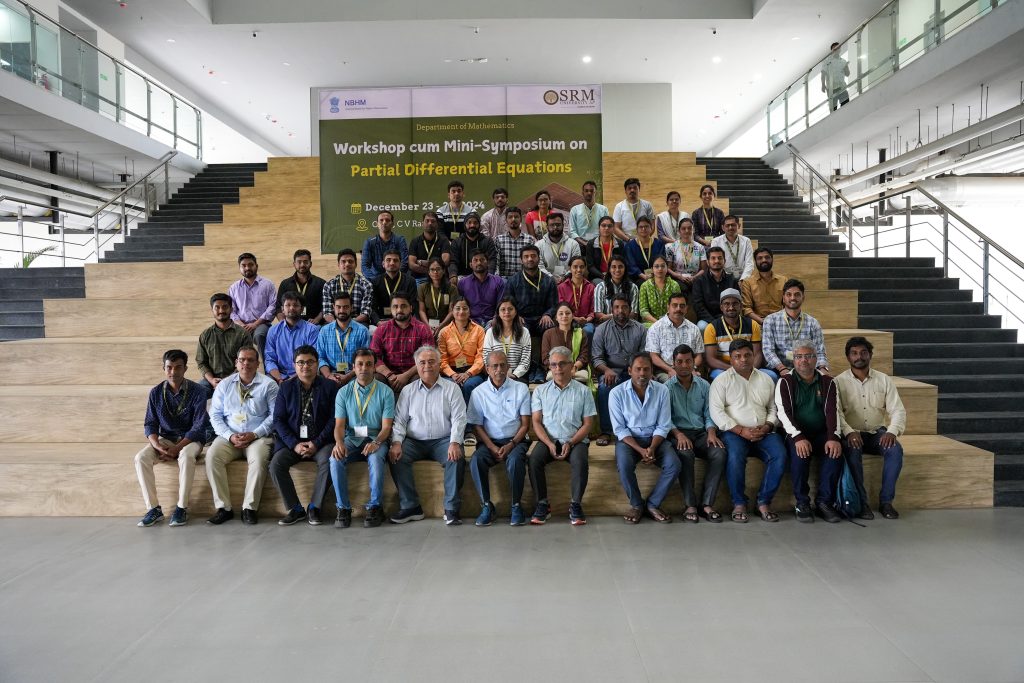
The Department of Mathematics successfully hosted a 6-day Workshop cum Mini-Symposium on Partial Differential Equations (PDE) from December 23 to 28, 2024, with generous financial support from the National Board for Higher Mathematics (NBHM). The event aimed to bridge theoretical foundations and cutting-edge applications of PDEs, fostering academic dialogue among researchers, scholars, and students.
The Workshop held on the theme “Basics of regularity theory of elliptic partial differential equations” featured sessions by subject experts including Prof. A. Adimurthi, Visiting Faculty, Department of Mathematics and Statistics, IIT Kanpur; Dr Karthik Adimurthi, Reader, Tata Institute of Fundamental Research Centre for Applicable Mathematics, Bangalore and Prof. Prosenjit Roy, Professor, Department of Mathematics, IIT Kanpur.
Themed “Applied Mathematics Symposium on Differential Equations: Theory, Computation, and Beyond”, the mini-symposium featured insightful talks by Prof. Mohit Dalwadi, Associate Professor in Applied Mathematics, Mathematical Institute, University of Oxford; Dr Satyajit Pramanik, Assistant Professor, Department of Mathematics, IIT Guwahati and Dr Moitri Sen, Assistant Professor, Department of Mathematics, NIT Patna. These experts delivered lectures on advanced topics, including elliptic PDE theory, computational methods, and interdisciplinary applications.
The primary aim was to provide participants with a comprehensive understanding of the abstract theory of elliptic partial differential equations, emphasising both foundational principles and modern computational techniques. Interactive sessions, problem-solving workshops, and collaborative discussions enriched the learning experience.
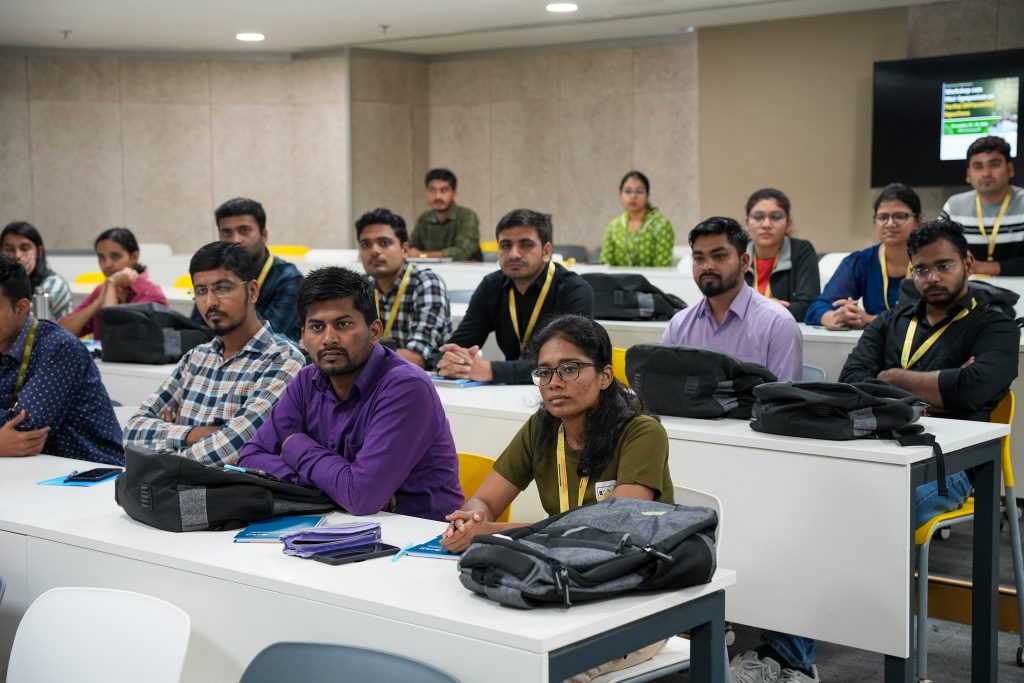
The event witnessed enthusiastic participation from 23 outstation researchers (from reputed institutions across India) and PhD scholars from the Department of Mathematics, SRM AP. The diverse cohort facilitated vibrant academic exchanges and networking opportunities.
A special felicitation ceremony was also held on December 24, 2025, to honour Vigyan Shri Prof. Adimurthi for his monumental contributions to mathematics. This segment underscored SRM AP’s commitment to celebrating excellence in scientific research. The Workshop cum Mini-Symposium served as a dynamic platform for disseminating knowledge, fostering collaborations, and inspiring future research in PDEs.
Continue reading → - A Panel Discussion on Decoding the Budget 2025-26 February 5, 2025

The Department of Economics at Easwari School of Liberal Arts organised a panel discussion titled “Decoding the Budget: Insights, Perspectives, and the Big Picture” on February 03, 2025. The event was designed to provide in-depth insights into the Union Budget 2025-26, focusing on fiscal priorities, economic implications, and sectoral impacts. The discussion brought together distinguished experts from academia and policymaking to analyse key announcements and their long-term effects.
The panel discussion featured three esteemed panellists:
– Prof. Vinish Kathuria (Director, Institute of Development Studies, Jaipur & IIT Bombay) – Expertise: Productivity Measurement, Economics of Regulation, and Environmental Economics.
– Prof. D K Nauriyal (Professor, Department of Humanities and Social Sciences, IIT Roorkee) – Expertise: International Trade, Development Economics, and Economics of Intellectual Property.
– Dr Sujit Kumar (Chief Economist, National Bank for Financing Infrastructure and Development – NaBFID) – Expertise: Banking & Finance, Infrastructure, and the Indian Economy.
The experts analysed the macroeconomic factors influencing the budget, such as inflation control, fiscal deficit management, and global economic trends. The panellists discussed the implications of the budget on critical sectors, including infrastructure, banking, environmental sustainability, and trade policies. The discussion highlighted significant policy changes to boost economic growth and social welfare initiatives. The Q&A session allowed participants to seek clarifications and gain deeper insights into budget-related policies and their long-term effects.
Students, faculty, scholars, and individuals interested in economic policy and financial analysis participate in the discussion. Participants also joined online as the event was in the hybrid mode.
The panel discussion on Decoding the Budget 2025-26 successfully gave attendees a clearer understanding of India’s financial and economic direction. The expert insights helped bridge the gap between budgetary announcements and their practical implications. Students, faculty, and policymakers benefited from the interactive discourse, enhancing their knowledge of economic policies and fiscal governance.
This insightful session emphasised the importance of informed economic discussions in shaping perspectives on national financial policies and governance strategies.
Continue reading → - Enabling Research Excellence: Paari School of Business organises Five-Day FDP February 3, 2025
 Research is essential for academics in today’s dynamic environment and SRMAP sincerely believes in the idea that research is the foundation to innovation and progress. The Department of Management at Paari School of Business organised a 5-day International Faculty Development Programme (FDP) in hybrid mode, focusing on the “Art of Writing High-Quality Research Articles in Management.” Resource persons, Prof. Piyush Sharma, Prof. Tak Yan Leung, Dr Kishore Gopalakrishna Pillai, and Dr Vimal Babu, provided participants with valuable insights into advanced research methodologies and effective academic writing strategies.
Research is essential for academics in today’s dynamic environment and SRMAP sincerely believes in the idea that research is the foundation to innovation and progress. The Department of Management at Paari School of Business organised a 5-day International Faculty Development Programme (FDP) in hybrid mode, focusing on the “Art of Writing High-Quality Research Articles in Management.” Resource persons, Prof. Piyush Sharma, Prof. Tak Yan Leung, Dr Kishore Gopalakrishna Pillai, and Dr Vimal Babu, provided participants with valuable insights into advanced research methodologies and effective academic writing strategies.The FDP aimed to deliver a comprehensive understanding of the essential components of academic research and publication, equipping attendees with the skills required to craft well-structured, high-impact research articles. The topics discussed during the five-day programme were particularly relevant and contemporary. Moreover, the resource persons encouraged the participants to enhance their research output, improve the likelihood of the participant’s publication in reputable journals, and contribute meaningfully to the academic community. The FDP sought to bridge the gap between research conceptualisation and publication, enabling faculty members to become more proficient and impactful researchers.
Participants greatly benefitted from the combined expertise and experience of these distinguished scholars, fostering a deeper understanding of high-quality research practices.
Continue reading → - INFINITUS’25 Flagged-off February 3, 2025
 SRM University-AP is set to host the most anticipated event of the year, INFINITUS’25, from February 05 to 08. The annual-fest, a celebration of innovation, art, and talent, will transform the campus into a vibrant hub of exhilarating activities and competitions and an entertainment haven.
SRM University-AP is set to host the most anticipated event of the year, INFINITUS’25, from February 05 to 08. The annual-fest, a celebration of innovation, art, and talent, will transform the campus into a vibrant hub of exhilarating activities and competitions and an entertainment haven.The annual-fest was flagged-off by Vice Chancellor, Prof. Manoj K Arora in the presence of Registrar, Dr R Premkumar; Deans of the three schools, Director-Student Affairs, Mr Anil Kumar Nigam; Director- Communications, Mr Pankaj Belwariar; Associate Director- Student Affairs, Ms Revathi Balakrishnan and Student Council President, Mr BVS Lakshman among others. The flag-off was followed by an exciting car rally that saw a fleet of cars, offering a glimpse of the festivities that will follow.
INFINITUS ’25 will commence with HACKSRM, a 22-hour non-stop hackathon followed by an array of technical, non-technical and cultural competitions. Some of the events to look forward to are FIFA Face-off, Road to Valor, BGMI Squad Tournament (Technical Competitions) Chronicles of Crime, Anime Jeopardy, IPL auction (Non-Technical Competitions) The Glitch Stage , Tech Tales, Cyber Vogue (Cultural Competitions) to name a few.
Apart from a multitude of competitions and gaming tournaments participants will also enjoy a platform to demonstrate their skills and creativity allowing a diverse array of talents to shine. INFINITUS ‘25 will showcase a variety of performances and cultural extravaganzas. Attendees can look forward to captivating musical acts from bollywood music-composer duo Salim and Sulaiman. The fest will feature talented individuals and groups displaying their artistic flair, culminating in a series of high-energy pro shows guaranteed to leave audiences in awe.
Continue reading →


